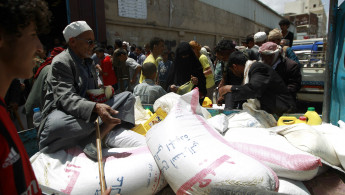Houthi leader denies theft of WFP food aid, claims 'rotten' supplies were sent to Yemen
Mohammed Ali al-Houthi, head of the Supreme Revolutionary Council, said in a statement that the rebels were "surprised" by the World Food Programme's allegations, made on Monday.
In comments carried by the rebels' Saba news agency, the Houthi leader hit back at the WFP with a counter-accusation that the UN's food agency is "fully responsible" for sending "quantities of rotten food" to Yemen.
He claimed that Yemen refused to allow the food into the country because "it violates standards and regulations and is not suitable for human consumption."
Houthi said, however, that the insurgents "welcomed" an independent investigation and called on the WFP to back up its accusations with proof.
He also accused the UN and other world bodies of bias, adding that the WFP "did not communicate officially" regarding the aid allegedly stolen.
"The work of these organisations is mostly politicised, and their position... confirms their work has shifted from independent to subordinate" to the United States and Britain, he said.
WFP said on Monday it collected evidence showing the rebels diverted shipments of food sent to help alleviate the country's humanitarian crisis.
The WFP is helping 12 million hungry people in Yemen and wants an "overhaul of the relief system," including biometric registration. It says the rebels resist such measures.
Last week, the UN cast doubt on Houthi claims that they had transferred power of the key Red Sea port of Hodeida to government officials - an important pledge made by the rebels in recent peace talks with Yemen's internationally-recognised government.
Local officials in Hodeida said the Houthis had placed officials sympathetic to their cause in key positions in the city's administration and coastguard - effectively rendering the power transfer meaningless.
"It's a stage play in which the Houthis handed over the port to their fighters after they put on coastguard uniforms," said the Hodeida governor, Al-Hassan Taher.





 Follow the Middle East's top stories in English at The New Arab on Google News
Follow the Middle East's top stories in English at The New Arab on Google News
![The UAE is widely suspected of arming the RSF militia [Getty]](/sites/default/files/styles/image_330x185/public/2024-11/GettyImages-472529908.jpg?h=69f2b9d0&itok=Yauw3YTG)
![Netanyahu furiously denounced the ICC [Getty]](/sites/default/files/styles/image_330x185/public/2024-11/GettyImages-2169352575.jpg?h=199d8c1f&itok=-vRiruf5)
![Both Hamas and the Palestinian Authority welcomed the ICC arrest warrants [Getty]](/sites/default/files/styles/image_330x185/public/2024-11/GettyImages-2178351173.jpg?h=199d8c1f&itok=TV858iVg)